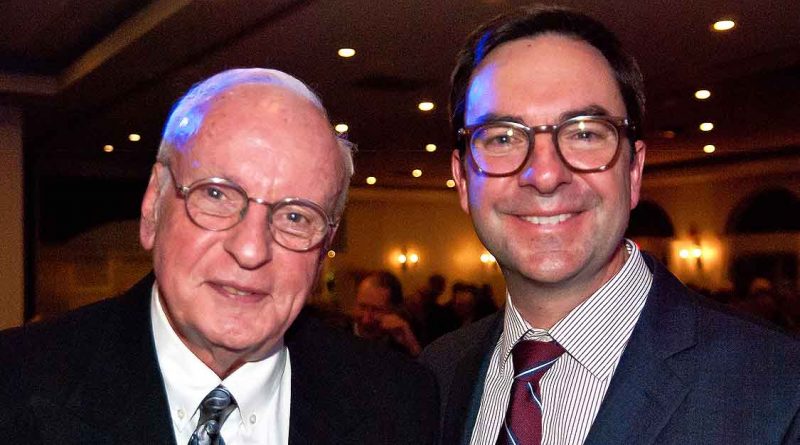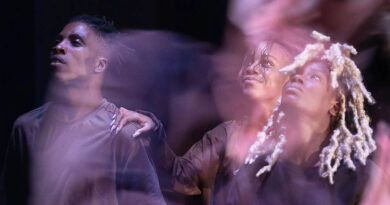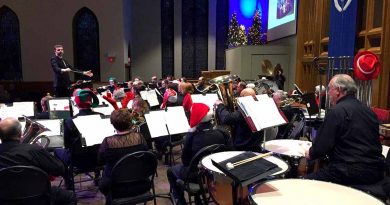This Week In Art/Culture/Entertainment
By John Swartz
Saturday night’s Sir John A. Macdonald Dinner at Hawk Ridge looked like it was sold out. By that I mean the tables were arranged with a little more space between them. The Orillia Museum of Art and History could have sold more tickets.
It’s not that the event is waning, there were still over 200 people in attendance, and certainly more people than when the dinner was held in smaller venues.
Dr. Kevin Kee was the keynote speaker. One of the things he didn’t mention to me when we spoke last week was his father is Dr. Norman Kee, and dad gave the introduction.
His speech was entitled Building Knowledge and Rebuilding Trust in the Digital Age. The audience was suitably interested in what he had to say. A good portion of the content was thumb nailed in last week’s column. I think what they found most interesting is when his talk turned to trust.
Some of what he has to say was about how historians deal with trusting the information they find, but a lot of it dealt with being trusted in conveying what historians find.
It’s kind of appropriate in a day when so many people don’t trust the experts on so many issues, yet they’ll trust someone they don’t know on the internet who is peddling junk. This is the thrust of his message because the internet is where most people get all their information. A few themes from the speech were elaborated on when the floor was opened to questions. The people posing the questions were acoustically unintelligible, but the answers provide clues to what was generally asked.
One person wanted to know what they do to find trustworthy information. Kee was quick to say local journalism is their first line of defense and that people need to support their local news media.
He said people in the community know local journalists as friends and acquaintances , or at least can point them out in a crowd. Does anyone really know Adrienne Arsenault? There’s relationships established, and we all know whose voice to listen to, and whose to treat as background noise.
More important is maintaining local news.
“Because we have paid for, because we invested in it, we will care about it,” Kee said. Even the national outfits are struggling and Kee was not indirect when he said people need to buy in locally.
“I think that’s what has to happen at the local level it will take the people in this room to say we’re going to put a couple hundred dollars,” and subscribe he said.
I think it would be a grave omission at this moment to not point out the yellow Support Independent Journalism button at the bottom of this column, or the Support Now link in the menu bar top of the page. Couple hundred, is his figure; we’ll take it, but 10 bucks a month is OK too. Carry on.
Another question seemed to be about how do historians find good information they can trust, secondarily how can they find good information on their own. Kee said he is part of a team developing a webscraper to suit their purpose and that it is similar to Google’s.
“Inherit to those tools is making decisions about what will count as something to keep and show me, as a historian, and what won’t. What’s important about that is we take the time to figure that out ourselves,” he said. Historians are not any different than anyone else, they ask the internet the question and get answers back, but deciding if the answer is correct is the tricky part.
“We forget what’s being generated to us, it has really been decided upon by a bunch of engineers in Silicon Valley. Maybe when we sent that query out onto the web we were thinking of something else, but they will choose through the algorithms they’ve written, that certain pieces will come back; typically they are pieces that have a lot links to them and pieces that are trying to sell us something.”
Someone asked why there isn’t a fact checker function to the internet (there are several). Kee had the appropriate answer.
“What you need to do is have faith in the person who created the fact checker, and that comes down to community,” he said. Knowing who is doing the checking doesn’t always mean you agree, but at least a person will have a better understanding of a local fact checkers tendencies and we can generally live with the information. It’s kind of like some people around here know if a certain reviewer doesn’t like something, they are going to like it, even though the review may not be wrong.
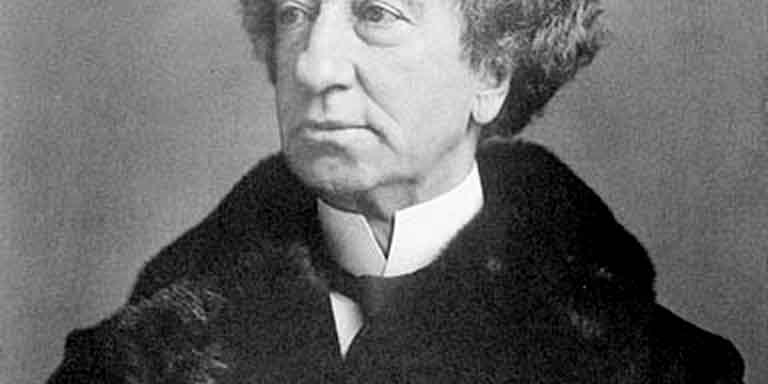
It was hard to tell, but another question seemed to have something to do with new knowledge of Macdonald that isn’t pretty, and how do historians deal with it. Kee’s quick answer was everyone has to recognize, including historians, things were different then. Indeed at last year’s dinner we all heard about how Macdonald and First Nations figures interacted with each other based on research of historical documents from First Nations sources. It turns out its not anywhere near as black as some people and the media paint the picture. Kee said we’ll likely suffer the same fate.
“Here we are in 2020 making decisions and doing the best we can. What in 2050 will people look back at us in 2020 and say, can you believe … isn’t that crazy?”
He prefaced that observation by saying the real problem is keeping up. We generate more information each day than anyone can handle. Even the Canadian government, which has to print virtually all their documents, can’t keep up with the daily generation of new information.
Finally Kee expanded on what he meant by print will be the best way to transmit history for some time. He used copyright as an example. In the digital world, copyrights expire and information disappears (for the most part – it really just gets extremely hard to find) where as once a page is printed, what is an author to do? Visit everyone and cut out a picture of say, John A. Macdonald that was licensed for use in a book? That’s not going to happen.
Also, last week the information I recounted about how many documents were generated by U.S. presidents was off. Lyndon B. Johnson had only 40,000 documents, not 400,000, and it was Clinton who had 4 million emails (only, not total documents as in Johnson’s case) not Obama.
OMAH has the opening of a new exhibit January 25 with a reception from 4 to 6 p.m. It’s called She Shoots… She Scores and it’s about women’s hockey (obviously) and coincides with the Ontario Winter Games here in Orillia. Special guests include Nathalie Rivard and Liz Knox. January 26 OMAH hosts Storytelling Orillia’s Side By Each monthly. This time guest speakers Ronda Hales and Stephanie Boyd (U.S.A. Women’s Hockey Team) will talk about women’s hockey at the 2 p.m. event.
![]()

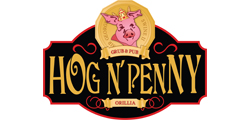

![]()
The Shorts
* A member of our music community, Jesse Parkes, passed away at Christmas. He was only 34 years old and had two children. Along with his dad, Steve, he operated Jack’s Music Hall. A benefit concert is happening Sunday from 2 to 8 p.m. at the Geneva. Steven Henry is organizing it, so there will be many musicians present and there will be a silent auction.
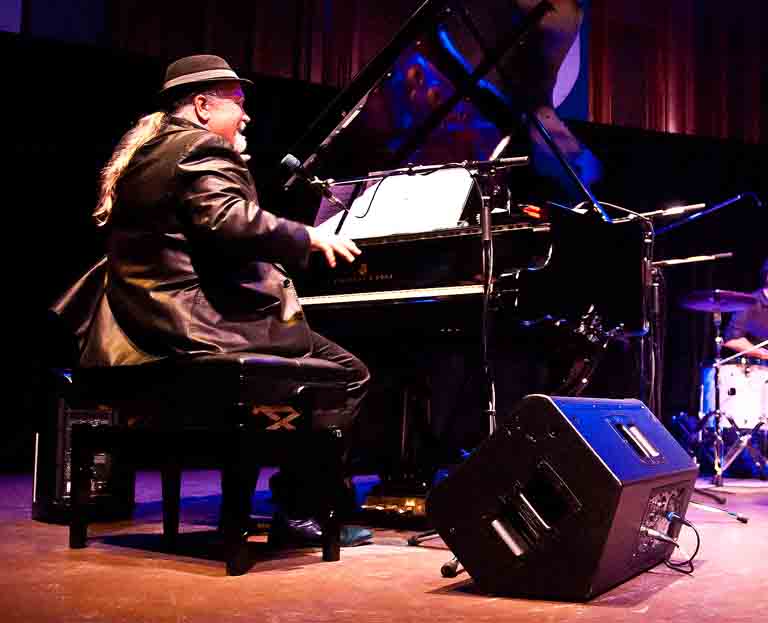
* The 9th Mariposa Folk Festival Gospel & Blues concert is happening Feb. 8 at st. Paul’s Centre. As usual, Lance Anderson is stickhandling the show. He’s got David Vest, Steve Marriner, Angelique Francis and Al Webster on board for the band. Get tickets online.
* The Mariposa Folk Festival audition concert doesn’t happen until April, but if you have a band, or know someone in a band, even if they don’t have a band and do their thing solo, send them here for details how to get an invite to try out. The deadline is Feb. 23.
* The Jubilee Chorale is rehearsing at a new venue, Sundial Lakeview Retirement Residence, and it’s a good time to dust off your pipes and join them. You’ve got time to warm up, their next concert is in May. Check them out every Wednesday between 7 and 9:15 p.m.
* Hibernation Arts has a group show by young, under 40, artists and a collection of work by Tammy Henry; this month’s gallery concerts are with Laurie Zwarych Thursday from 7 to 9 p.m. and with Caleb Kearey-Moreland Jan. 30. The next show, Love, is also a group show; if want in on it with your art, email mollytas@gmail.com. Almost next door in the Arts District at Three Crows Speak gallery, Liz Schamehorn’s work is hanging around.
* Jim Harris is booking musicians for the Farmers’ Market 2020 season. Shoot him an email to jimharris@vianet.ca .
* Travis Shilling has a exhibition at the Burlington City Arts Center in Vermont. He got a great review. The thing I like most about the review is it doesn’t read like pretentious pandering like most art reviews do.

* Congrats to the Bleeker crew. They have a new tune and video out for the song Disaster. Another song of theirs, Straight For The Money, is a finalist for the Canadian Independent Music Video Awards. Scroll down, click the Bleeker image and vote. Like in Chicago, you can vote every day, but only once per day. I’m sure, like in Chicago, your dead relatives can vote too. Whatever, just vote, it’s a good tune.
* The Opera House has two dance programs happening over the next few days. Friday evening the Simcoe Contemporary Dancers have a show called Confluence to celebrate the 10th anniversary of the company. Monday evening a fundraiser for the Opera House called Winter Dance Gala features Highland dancer Cole Leslie, the reigning Ontario, Canadian, and 4th place World Champion, along with Simcoe Dance Festival award winning performances. The Mudmen return for their annual January concert, in February, on the 1st. Get tickets online.
* Coming up… the Hog ‘N Penny has trivia night with Bill Dunlop every Thursday evening; Olivia Duck is in Friday night; The Station play Saturday night… the Brownstone has James Gray and Deeps (both at Mariposa Folk Festival last year) returning Friday night; Mountain Head and F. Scott & The Nighthawks are playing Saturday night; every Tuesday is Open Mic Night… Steph Dunn is at Tailwinds Jan. 26… The Jazz Byrds play Sanafir every Saturday evening.
(Photos by Swartz – SUNonline/Orillia)

